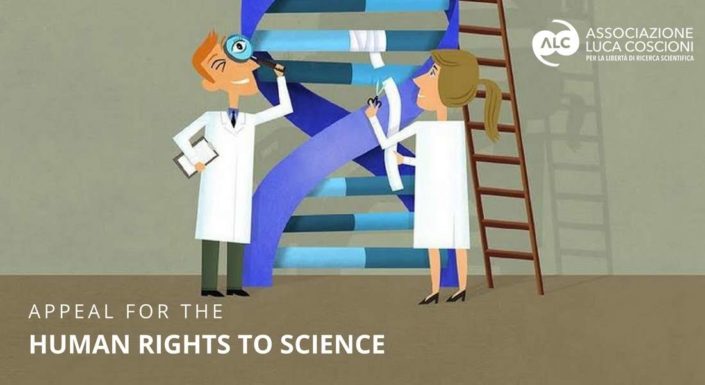
We the undersigned
- considering that science is an important pillar of any open and democratic society based on free elections and the Rule of Law, and that democratic societies are the only ones capable of ensuring the full enjoyment of human rights and civil liberties codified in international treaties;
- considering that scientific research and access to the benefits generated by it fuel human development and welfare;
- cognizant that freedom, to be enjoyed individually, should be limited by rules that allow for the expansion and enrichment of human knowledge;
- considering that the human right to science is enshrined in article 27 of the 1948 Universal Declaration of Human Rights; in article 15 of the 1966 International Covenant on Economic, Social and Cultural Rights; in article 13 of the Charter of Fundamental Rights of the European Union; in article XIII of the American Declaration of Human Rights; in article 14 of the Protocol on Economic, Social and Cultural Rights to the American Convention on Human Rights; in article 42 of the Charter of the African Union; in article 42 of the Arab Charter of Human Rights; and in article 32 of the Human Rights Declaration of the Association of South-East Asia Nations;
- recalling, in particular, that article 15 of the International Covenant on Economic, Social and Cultural Rights obliges States Parties, among other things, to recognize the right of everyone to enjoy the benefits of scientific progress and its applications , and to benefit from the protection of the moral and material interests resulting from any scientific, literary or artistic production of which she/he is the author;
- recalling that the steps to be taken by the States Parties to the Covenant to achieve the full realization of these rights include those necessary for the conservation, the development and the diffusion of science and culture, and to respect the freedom indispensable for scientific research and creative activity;
- that the Covenant clearly urges states to recognize the benefits to be derived from the encouragement and development of international contacts and co-operation in the scientific and cultural fields;
- convinced that, if protected and promoted, the right to science can be conducive to the full enjoyment of other human rights, including the right to health, the right to life, freedom of expression, freedom to hold beliefs, the right to adequate conditions of living, and the right to property;
- believing that scientific research should be supported publicly and privately to fully implement these rights, and that investment in science should become a priority for governments and the private sector alike;
- believing that science education is an important element in creating more responsible citizens able to participate in the construction of free, fair, open democratic societies;
- convinced that science, and the scientific method, are a clear example of fact-based collaborations to address global challenges.
We call on governments
- to respect their international obligations concerning the full enjoyment of human rights and, in particular, the duty to respect, protect, fulfill, and promote the right to science, and to promote debates within the United Nations system on the issue;
- to support the scientific enterprise at the national, regional and international levels that are also gender inclusive, and to promote access to discoveries and developments in a transparent and open manner, consistently with local and global interests and needs, both public and private;
- to promote and protect scientific culture and education, including humanities, at the national level, including through international cooperative projects with particular attention to developing and least developed countries;
- to limit the regulation of research only insofar as it may violate human rights, and the regulations of limitations to the enjoyment of human rights recognized in international law, the right to privacy included;
- to dedicate a specific section to science within the periodic report to the UN Committee on Economic Social and Cultural Rights, to address science-related issues during their Universal Periodic Reviews before the UN Human Right Council, with the aim of strengthening freedom of research, and sharing the latest discoveries and applications deriving from it, with the aim of ensuring that the right to science, a right rarely addressed, is actually discussed at the international level.